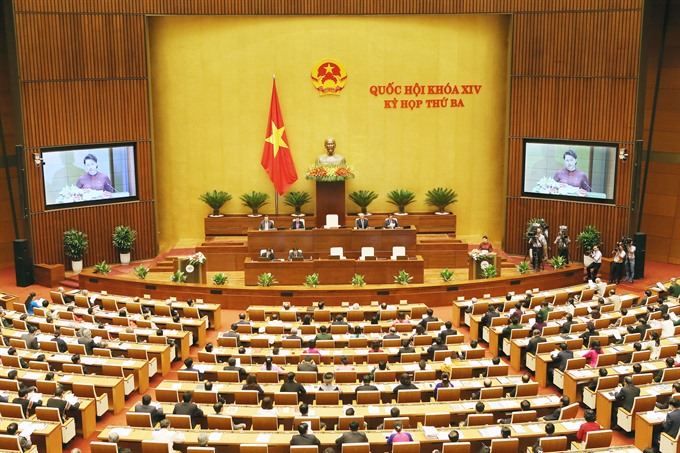 Politics & Law
Politics & Law

President of the Việt Nam Fatherland (VFF) Central Committee Nguyễn Thiện Nhân delivered a report gathering the opinions and recommendations of voters nationwide to the National Assembly (NA) during the legislature’s third session on Monday.
 |
| The 14th National Assembly opened its third session in Hà Nội yesterday. — VNA/VNS Photo Nguyễn Dân |
HÀ NỘI — President of the Việt Nam Fatherland Front (VFF) Central Committee Nguyễn Thiện Nhân delivered a report on the opinions of voters to the National Assembly (NA) during the legislature’s third session of the 14th legislature that opened in Hà Nội on Monday.
The report included 3,288 proposals, with 741 of them collected by NA deputy delegations and the rest noted by the VFF.
Most of the opinions praised the Government and VFF’s performance in the past five months in implementing Party and NA resolutions, which include measures to maintain macroeconomic stability and development.
Social welfare policies continued to be conducted, while foreign relations and international integration were strengthened, voters said, adding that defence, social security and national sovereignty were safeguarded.
However, they showed concerns over several issues such as unsustainable growth and poor competitiveness, high public debt, low productivity, slow economic restructuring, food safety violations, serious environmental pollution, chaotic traffic and landslides that affect people’s lives.
Based on voters’ opinions, Nhân proposed the Party and State continue to direct the implementation of the Party Central Committee’s resolution on Party building, while imposing strict punishments on Party members and officials who commit violations.
Nhân suggested the Government inspect State management of sand exploitation and forest protection nationwide, while urging heads of the People’s Committees of provinces and cities to devise plans to tackle violations in the fields.
Along with implementing the resolutions of the fifth meeting of the 12th Party Central Committee on perfecting socialist-oriented market economy institutions, improving State-owned enterprises’ efficiency and developing the private economy, it is necessary to complete policies and regulations to improve the investment environment and support start-ups, and speed up administrative reform, said the report.
The VFF Central Committee’s President also suggested the Government direct the Ministry of Agriculture and Rural Development and localities to improve agricultural restructuring, focusing on encouraging enterprises to invest in the sector and assisting farmers and businesses to use advanced technology.
At the same time, the Government should devise stronger measures to protect the environment and end illegal exploitation of the country’s natural resources, while issuing regulations on the assessment of food safety in food production and trading.
He also recommended closer co-ordination between the VFF and society in caring for invalids, martyrs’ relatives and those who served the nation.
Overcome difficulties
Earlier the same day, National Assembly Chairwoman Nguyễn Thị Kim Ngân called on the Party, people and army to strengthen solidarity to overcome challenges to fulfilling 2017’s socio-economic development goals.
The top legislator made the appeal in her opening speech at the third plenary session.
She urged the nation and people to promote unity of thought and action to implement resolutions adopted at the 12th National Party Congress, particularly resolutions passed at the fifth meeting of the 12th Party Central Committee.
Despite positive socio-economic development, Việt Nam faces innumerable difficulties, she said.
Economic growth is not sustainable, while some basic targets have been missed, she said, pointing to difficulties in industrial production and agriculture as well as damage caused by climate change.
Legal violations in exploiting natural resources and mining have provoked public concern, as has environmental pollution, she said.
Infringements of food safety and hygiene laws, poor land use and management, along with corruption and wastefulness are still of concern, she added.
With solidarity, creativity and work to benefit the people, the legislature will aim to handle a lot of business at the third sitting, Ngân said.
The 22.5-day sitting is set to see 13 bills and five draft resolutions discussed and adopted, and five other draft laws to be discussed.
Among bills scheduled to be passed at this session are the law on adjusting, supplementing a number of articles of the 2015 Penal Code, the law on support for small and medium-sized enterprises, the law on management and use of State assets (revised) and the law on the State’s responsibility for compensation.
The session will also examine important socio-economic matters and evaluate the implementation of laws and policies on food safety in 2011-16.
Three working days during the session will be devoted to the questioning of cabinet members.
The third plenary session is scheduled to conclude on June 21.
Socio-economic report
Also on Monday, the legislature heard the Government’s report on socio-economic development and State budget tasks in 2016 and in the first months of 2017.
Under the report, presented by Deputy Prime Minister Trương Hòa Bình, the consumer price index in April increased by 0.9 per cent compared to December last year.
Meanwhile, the interest rate was stable and is likely to fall. Credit growth climbed by 5.75 per cent – the highest year-on-year rise in six years.
The country’s export turnover surged 16.8 per cent, mainly in processing and manufacturing industries, and agricultural products, the report said.
State budget collection fulfilled 32.7 per cent of the plan for the year, up 17.8 per cent. Newly-registered and added foreign direct investment hit US$10.6 billion, up 40.5 per cent.
Nearly 40,000 new enterprises registered for establishment in the period, with total additional capital of VNĐ825 trillion (more than $36.7 million).
However, GDP growth in the first quarter reached only 5.1 per cent, lower than the same period last year (5.48 per cent).
Bình said ministries, sectors and localities need to take measures to achieve greater growth in the remaining quarters, towards realising the year’s GDP growth target of 6.7 per cent.
According to the Deputy PM, the Government and Prime Minister Nguyễn Xuân Phúc directed ministries, sectors and localities to accelerate equitisation, divestment and improvement of State-owned enterprises (SOEs), however the process was slow.
A steering committee was established to examine and devise solutions for each major loss-making project, he said.
Attention will also be paid to restructuring, improving the performance of and quickening equitisation of SOEs, especially ineffective firms.
For major loss-making projects, the Government has asked ministries, sectors, localities, groups and corporations to roll out financial measures in line with market rules and risk sharing, without support from the State budget.
Measures have been outlined to promote culture development, social equality, poverty reduction, job creation, education, and health care.
The Government has also instructed agencies to improve environmental management and protect the environment by closing natural forests, reviewing hydropower projects and rejecting projects with high risk of causing pollution and imposing strict punishments on violators.
Bình said the Government has called for immediate and long-term measures to deal with climate change, prevent natural disasters including floods, storms, droughts, saline intrusion and landslides, especially in the Central, Central Highlands and Mekong Delta regions.
It has implemented the Resolutions of the Party and NA on national defence, security and foreign relations, contributing to maintaining peace and stability, and raising the prestige of Việt Nam.
Also in the morning session, Vũ Hồng Thanh, head of the NA Commission for Economic Affairs presented a report on the implementation of the NA’s Resolution on socio-economic development in 2016 and the first months of 2017, which said the country’s macro economy was stabilised, major balances were ensured and inflation was at a safe limit.
The commission suggested that the Government’s report should give more detailed assessment of some issues, especially on economic growth and export turnover.
It agreed on measures mentioned in the Government’s report, together with those set in the Resolution of the NA on the socio-economic development plan for 2017, he added. — VNS